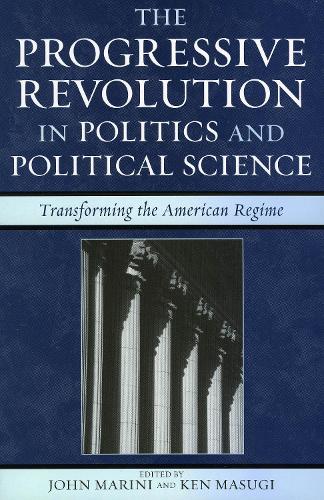
The Progressive Revolution in Politics and Political Science: Transforming the American Regime
(Paperback)
Publishing Details
The Progressive Revolution in Politics and Political Science: Transforming the American Regime
By (Author) John Marini
Edited by Ken Masugi
Contributions by Paul Carrese
Contributions by Eric R. Claeys
Contributions by Edward J. Erler
Contributions by Tiffany R. Jones
Contributions by John Marini
Contributions by Ken Masugi
Contributions by Will Morrisey
Contributions by Peter C. Myers
Bloomsbury Publishing PLC
Rowman & Littlefield Publishers
30th June 2005
United States
Classifications
General
Non Fiction
Central / national / federal government policies
324.27327
Physical Properties
Paperback
388
Width 168mm, Height 227mm, Spine 22mm
517g
Description
We cannot understand our current political situation and the scholarship used to comprehend our politics without taking full account of the Progressive revolution of a century ago. This fundamental shift in studying the political world relegated the theory and practice of the Founders to an antiquated historical phase. By contrast, our contributors see beyond the horizon of Progressivism to take account of the Founders' moral and political premises. By doing so they make clear the broader context of current political science disputes, a fitting subject as American professional political science enters its second century.
The contributors to the volume specify the changes in the new world that Progressivism brought into being. Part I emphasizes the contrast between various Progressives and their doctrines, and the American Founding on political institutions including the presidency, political parties, and the courts; statesmen include Frederick Douglass, Theodore Roosevelt, Woodrow Wilson, and John Marshall. Part II emphasizes the radical nature of Progressivism in a variety of areas critical to the American constitutional government and self-understanding of the American mind. Subjects covered include social science, property rights, Darwinism, free speech, and political science as a liberal art. The essays provide intellectual guidance to political scientists and indicate to political practitioners the peculiar perspectives embedded in current political science.
Published in cooperation with The Claremont Institute.
Reviews
Recommendeddddd * Choice Reviews *
If you want to know why the Constitution became a 'living' document, why the size and scope of government cant be limited, and how we got here, you must get it. -- Peter W. Schramm, Executive Director of the John M. Ashbrook Center for Public Affairs and a Professor of Political Science at Ashland University
Edited by Claremont Institute senior fellows John Marini and Ken Masugi, The Progressive Revolution in Politics and Political Science brings together eleven essays to explain the conflict between classic natural right and historicism that has been at the core of the Western philosophic tradition, and which plays itself out in an American context as the conflict between our country's founding principles and the modern administrative state. John Marini, who perhaps more than anyone has plumbed the depths of Progressive thought and found its source in Hegelian historicism, provides a breathtakingly accurate account of the Progressive transformation of the American Minddd * Claremont Review of Books *
Edited by Claremont Institute senior fellows John Marini and Ken Masugi, The Progressive Revolution in Politics and Political Science brings together eleven essays to explain the conflict between classic natural right and historicism that has been at the core of the Western philosophic tradition, and which plays itself out in an American context as the conflict between our country's founding principles and the modern administrative state. John Marini, who perhaps more than anyone has plumbed the depths of Progressive thought and found its source in Hegelian historicism, provides a breathtakingly accurate account of the Progressive transformation of the American Mind * Claremont Review of Books *
Recommended * Choice Reviews *
Author Bio
John Marini is a senior fellow at the Claremont Institute and associate professor of political science at the University of Nevada, Reno. He is the coeditor of The Imperial Congress: Crisis in the Separation of Powers (1989) and the author of The Politics of Budget Control: Congress, the Presidency, and the Growth of the Administrative State (1992).
Ken Masugi is director of the Center for Local Government at the Claremont Institute. He is the coauthor, coeditor, or editor of seven books on American politics and political thought.
